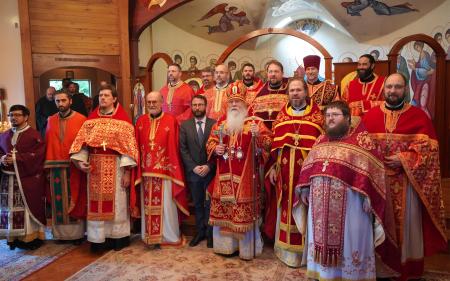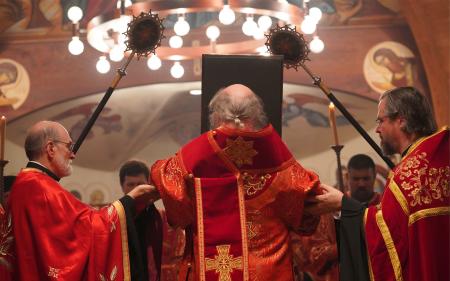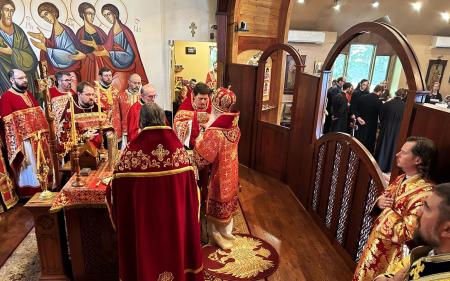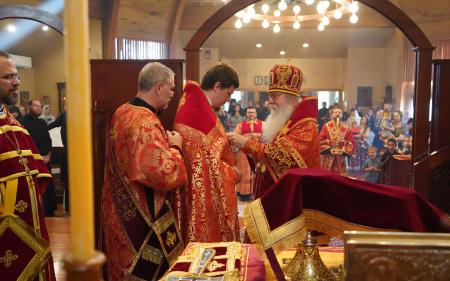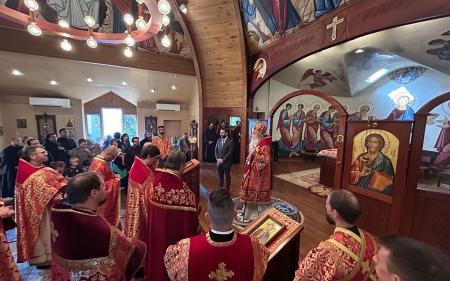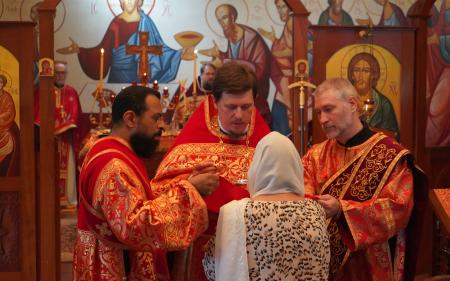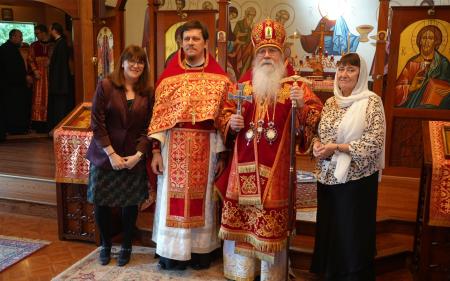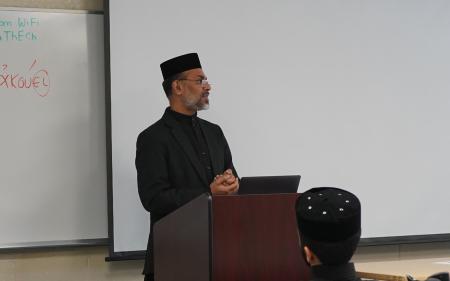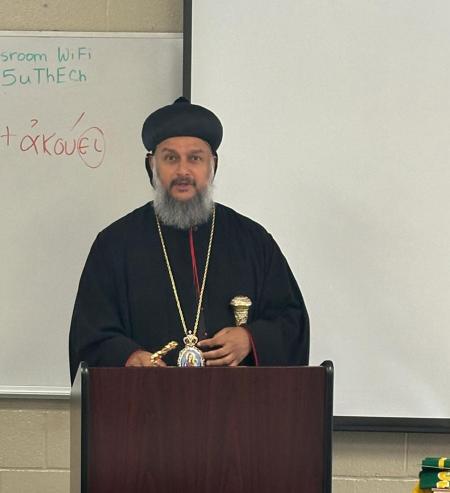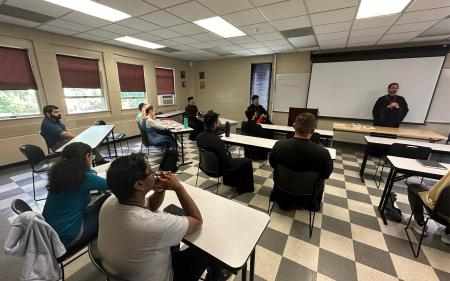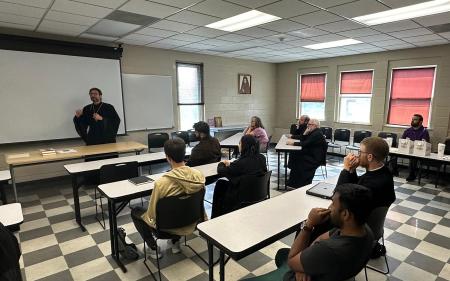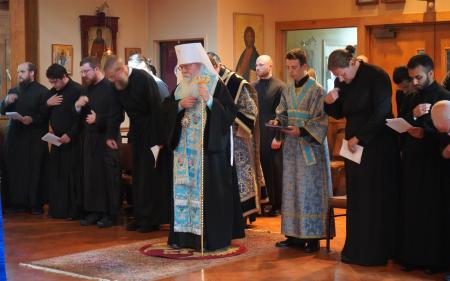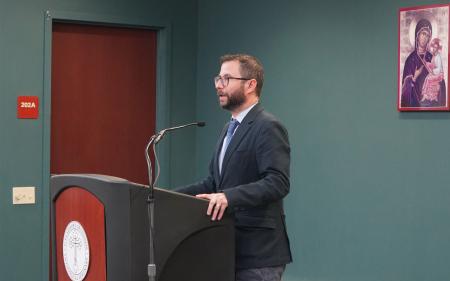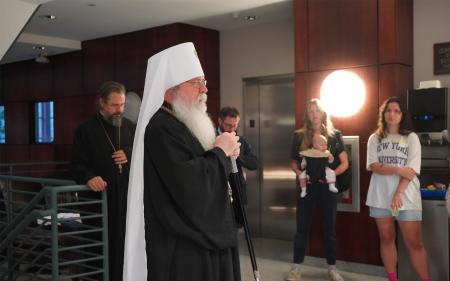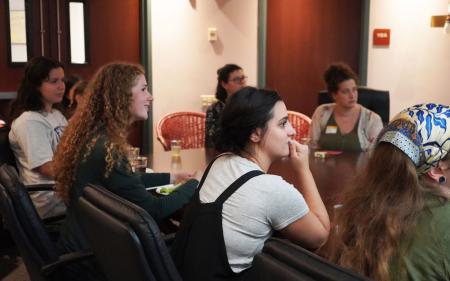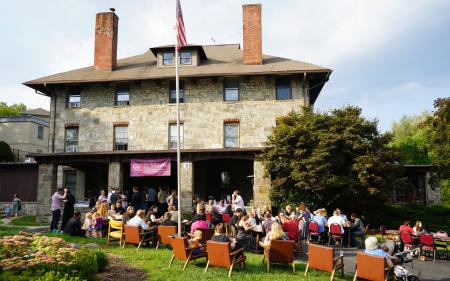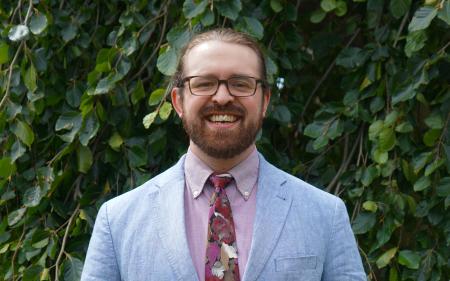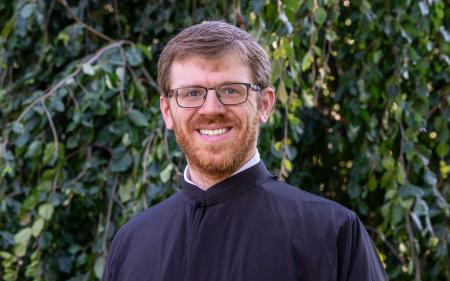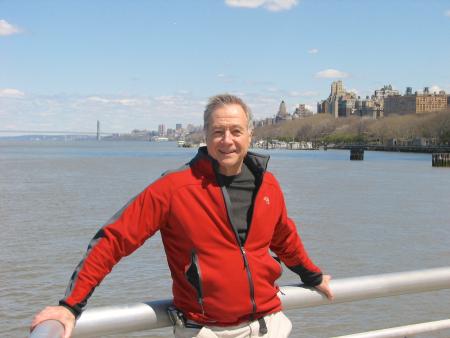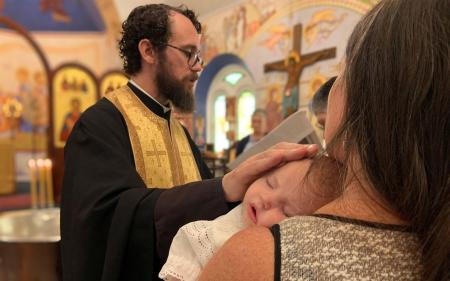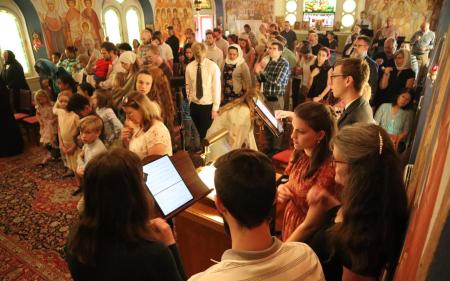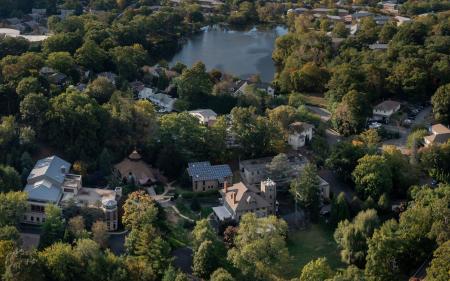Faculty/Staff Spotlight: Getting to know Zach Mandell
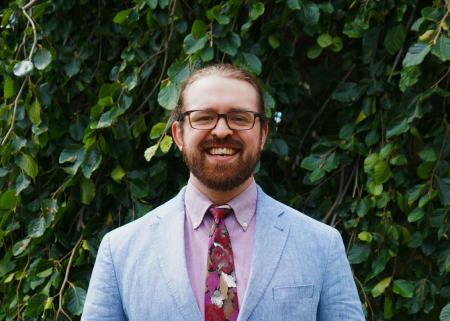
The newest hire at St Vladimir’s Seminary, Zachariah Mandell (M.Div. ’20), has a multi-faceted job description: Director of Admissions, Financial Aid, and Alumni Relations and Assistant Director of Chapel Music. We sat down with Zach to talk about his upbringing, his own journey within the Church, and his vision for seminarian life and community.
Zach, please share a bit about your upbringing in the Church and your ties to the seminary.
I was born into a cradle Orthodox family in central Pennsylvania with a mix of Carpatho-Rusyn, Slovak, and some Russian roots. My dad has always been the choir director of the parishes we’ve been a part of, and my mom has always been a leading soprano. Both sides of my family were largely Orthodox; on my mom’s side, my grandfather, Fr Thomas Hopko, and great-grandfather, Fr Alexander Schmemann, are well-known for their contributions at St Vladimir’s. Even with these deep roots, there was never any pressure to go to seminary, for which I'm really grateful because it really ended up, thank God, being my own journey, my own decisions, my own movement.

Zach directing the righthand choir at St Vladimir’s Seminary on the Feast of the Exaltation of the Cross, 2024
I think I can point to a few experiences where I started to engage my own faith more seriously. I went to Penn State University, and one of the big reasons I went, other than wanting to march in the Blue Band, was because it had such a strong OCF associated with it and a strong parish, Holy Trinity Orthodox Church. When you're in college, it’s not always easy to wake up on Sunday morning to go to church, and having that support, those friendships, and the choir to sing with were all really important for me as a college student.

Marching in the Penn State Blue Band, Fall 2013
In my junior year of college, I studied abroad in Greece, and as a deeply naive 20-year-old, I was thinking to myself, “This is amazing–it's an Orthodox country, so it's going to be so easy to just be 'orthodoxing' all the time.” I had already traveled abroad in Mexico, Egypt, and Italy, but this turned out to be the first time in my life that I felt homesick or had ever experienced culture shock, and those feelings were particularly strong in the context of church. I wasn’t prepared for how isolating it felt to be in church where everything was so familiar but not familiar at the same time, and it pulled the rug out from under me a little bit.
Part of what made it so difficult was that as a classics major, we were required to visit archaeological digs and museums every weekend, so I wasn't really going to church much at all while I was there. After the first month or so, I'd go and sit on a rock somewhere with a view of the Acropolis and listen to a recorded liturgy (this was before live-streaming), and I thought that could be enough to have some connection to church.
I think it was the difference in the aesthetics of worship, and probably, my own immaturity, that was making me feel a bit isolated. What furthered that isolation was not just missing the music I liked, but missing something very real—the communion of church, both the Eucharist itself and the extended communion, the community. It makes sense, especially having grown up so deeply rooted in a specific church tradition. Being in that same church but feeling like it wasn’t my own challenged my sense of identity because I wasn’t comfortable in a way I always had been.
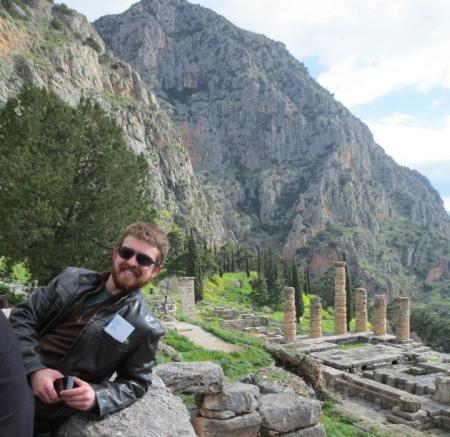
At an archaeological site in Greece, Spring 2013
That was a turning point, a critical experience for me. I had been going to church before that, but the feeling of missing something, that hunger for communion and community, made me realize that my faith wasn’t just an idea; it was something real.
I was fortunate to have the opportunity to go back to Greece this past year, and I realized, "I can do this now." This new sense of appreciation came from more experience, more curiosity about things that aren’t my way—exploring that discomfort, learning to say, "This is uncomfortable, but that’s interesting."
And after that experience in Greece, and even a little bit before that, I started engaging more. That’s when I began to really talk to my grandfather–in the last few years of his life–and have more serious conversations with him.
At the same time, I was working at youth camps—specifically, the New England Archdiocese Youth Rally, where I worked from 2012 to 2019. That’s when I really started engaging with the priests there, seeing them as mentors: Fr John Hopko, my uncle, Fr Sergius Halvorsen (who I now work with), and Father Dennis Rhodes. That’s when I began to read more. I studied Greek and Latin Language and Literature in college, and that gave me a little window into a new curiosity as I began reading the Church Fathers and even just the Gospel, thinking, “Wow, look at the Greek!” There was so much depth. I’d think, “Oh, this word is so cool.”
And, you know, as a millennial, of course, I was listening to podcasts. But don’t worry, it was Fr Tom’s podcast! That was such a gift for me—not just for my own spiritual formation and education, but also because it gave me a way to experience my grandfather as a teacher. I saw how other people experienced him and realized, “Huh, that’s just how he is.” It showed me a more complete picture of him, especially at that point in his life. I saw a person who was clearly striving toward wholeness. I’d listen to a podcast and think, “Yep, same guy who holds court at Thanksgiving, talking about Church Fathers and Scripture, telling people, ‘No, you’re wrong.’” (laughter)
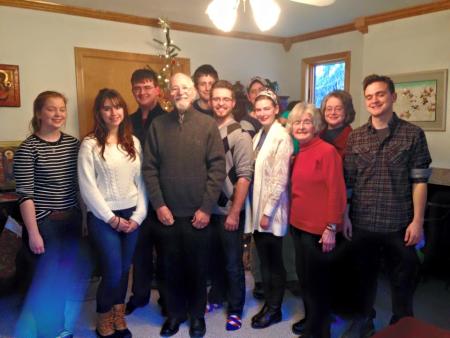
A family visit to Ellwood City, PA
It was like listening to him in real life, and in these later years, experiencing him in those two ways helped me see how others saw him. I felt like I had a connection, like when someone would ask, “What’s he like?” and I’d say, “Well, kind of like what you see, but also, I’ve gone fishing with him, and he kisses the fish before throwing them back in the water.” All of us grandkids have memories like that.
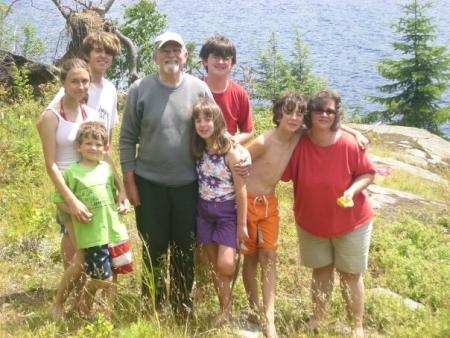
On the lake with Grandpa
I applied to grad school during my last year of college because that’s just what you do when you study something as esoteric as Classics and Greek and Latin Literature—you apply for grad school. So, I went to grad school, and I got one semester in. Then I went to the OCF College Conference, and I thought, “I think I’m going to apply to seminary.”
Two months before my grandfather passed away, in January 2015, I visited him on my way back to school and told him, “I think I’d like to go to seminary.” He encouraged me to finish my degree first and then go to seminary, and that’s exactly what I did.
Thank you for sharing that fascinating look into your journey within your own faith and your deep family ties to the seminary. You are now the Assistant Director of Chapel Music here. Let's talk about your musical background. How did your interest in music begin? Was it mainly through your family, and how did playing instruments fit in? How did you grow into what you’re doing now?
Yeah, so in the beginning, as I mentioned earlier, my dad was always the choir director at the parishes I grew up in, and my family was very musical—my mom’s a singer, and my dad was a music teacher and choir director. Some of my earliest memories are of going to church with my dad when I was about four, going to Vespers, standing in the choir loft, and singing along to the bass part with my squeaky little voice. There’s even video evidence of me singing along with my dad in Vespers. So, I grew up with music in church, always around the choir loft.
When I was in elementary school, I started playing trombone, which was hard to avoid with a dad who was a band director. I started in fourth grade, even though the band director told me my arms were too short to play it—I chose trombone anyway. I loved it and kept playing through high school, while also singing in every ensemble.
Church music was always something I loved, but it really blossomed in college. I was asked to be the choir director at Holy Trinity in State College during my senior year, and that’s when I really started to dive into the services, the liturgical flow, and the beauty of hymnography. There was so much depth in matins and hymnography that I hadn’t experienced in my home parish.

Directing the choir at Sts Peter and Paul Orthodox Church, Buffalo, NY, Spring 2016
After graduating, I moved to Buffalo, where a parish needed a choir director. Fr Vlad Zablotskyy hired me, and as a poor grad student, I jumped at the chance. That experience shaped my love for liturgical music—not just the music itself, but also the role of the choir. I started to understand how we lead the congregation, not just sing. It became one of my core focuses when I went to seminary, where I wanted to dive deeper into liturgical texts, hymnography, history, and the pastoral aspects of church music.
While at seminary, I took advantage of every opportunity to study conducting, music theory, and composition. Deacon Harrison Russin and Robin Freeman created classes for those of us who were really interested, and I was able to conduct and sing at a high level in the chapel, in performances, and in recordings.
After graduating, I was hired as the full-time choir director at St Mary’s Orthodox Cathedral in Minneapolis. It was an incredible opportunity to apply what I had learned and explore what it meant to be in a pastoral role—working with people of different backgrounds, desires, and spiritual needs. At St Mary’s, we explored deeply what it means to be a church choir, and how to put that into practice.

Performing a choral concert at St Mary’s Orthodox Cathedral, Minneapolis, MN, December 2022
In terms of objectives, especially at a place with a high musical level, it’s easy to get preoccupied with the music itself, but the balance is important. Choirs in the Orthodox Church have a lot to balance. On one hand, services will happen no matter what, people are often volunteering, and life happens, so it's not entirely about musical perfection. It's a service and ministry, a sacrifice of praise, and we bring ourselves and offer ourselves where and when we are. On the other hand, we're also striving to offer our best to God. We offer the first-fruits, the whole-burnt offering–so it's also, I would say, not just a nice idea but necessary to be intentional, mindful, and strive to sing the music well so that our service and ministry of leading the congregation in worship can be beautiful, prayerful, AND unobtrusive. And maybe most importantly, it's necessary to have the ability to move on and be mindful of the moment, not to be distracted by the mistakes (or even the really beautiful moments), but to say, ok, thank God, whoops, wow, and continue. So I guess what I mean to say is that, as a service and ministry in the church, we're trying to balance where we are now with where we want to be in a way that keeps us engaged but not obsessed with progress or mistakes, and also that is not static. The Orthodox faith is dynamic, and I believe a choir should strive to reflect that, always becoming something more together.
So for us, it wasn’t just about concerts—our role was primarily the services. How do we engage with that? How do we become a group within the parish that is welcoming and part of the larger community, while still being a distinct group? That was the beautiful challenge we embraced.

Directing at St Vladimir’s as a seminarian
Coming back here after directing for a few years in a parish has been really cool. Standing on the same podium where my hands were once shaky, now with more experience, feels like a beautiful snapshot of my life’s trajectory—same guy, same place, but a different world. There are so many talented singers here right now, and building musical trust with them so quickly has been incredibly exciting. I’m really looking forward to what we’ll get to do together this year. So, I guess there's a bit of a "stay tuned" there!
It’s also worth mentioning that you're also a composer. You attended the 2023 Summer Music Institute Composition Workshop with Benedict Sheehan, where your music was performed and analyzed. Are you still involved in composing?
Yes, I am, though I haven't produced anything recently. But the composition process is something I’ve been really passionate about over the last few years. After the 2023 workshop, I convinced some music colleagues from Minneapolis to start composition workshops with me, where we’d bring our music and work through it together.
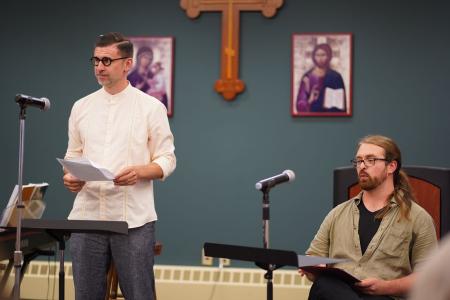
Having his composition sung in the Composer’s Reading Session during the 2023 Summer Music Institute
Last October, at the Midwest Diocesan Assembly, I was proud to bring six or seven compositions from my friends and fellow singers in Minneapolis and St Paul to share with the St Andrew of Crete Music Society. It was such an incredible moment—realizing we were doing something so special.
Now, I’ve had the chance to work with talented composers on campus, talking about their music, playing with it, and helping them shape it. Even just having a small role in helping them find what they want it to be has been so cool. I’m feeling inspired to pick up the pencil again and get those creative juices flowing!
Moving on to your experience as a seminarian at St Vladimir’s Seminary. In your new role as Director of Admissions, Financial Aid, and Alumni Relations, how does your experience as a seminarian shape your vision for the student experience here? We’ve already seen you get involved in community life beyond your formal role. Can you talk about that?
Sure. Being a seminarian, and now working at the seminary, I’ve come to realize the importance of balance. Seminary life is intense, to put it mildly. Deacon Harrison Russin said it well at orientation: in grad school, you’re a student. But in seminary, you’re a student, you're serving, you're forming—it’s many roles combined. There are so many expectations, like helping out with last-minute tasks for visiting bishops, alongside community service and chapel life. It’s a humbling experience, and it requires sacrifice.
For me, as a single guy coming from grad school, the transition was easier than for some who give up a lot—stable family life, careers—to come to seminary. But I still experienced imbalance, focusing too much on my tasks and neglecting myself. It’s a blessing to be back here now, and while I don’t claim to have magical wisdom, I can offer my experience to current students. I live in the same space as them and try to model the balance I believe is important. Balance isn’t something you achieve and hold on to—it’s a constant process of falling down and getting up again.
It’s really fulfilling to see new students come in, often being the first person they meet as Admissions Director, and to share my journey with them, offering encouragement and support. I respect anyone who makes the decision to come here—it’s not one made lightly.
Reflecting on my own time here, by my last year, I was so focused on grades and perfection that I started getting migraines and vertigo—deeply stress-related. It wasn’t just the workload, but how I approached it. Expectations—both from others and myself—were high, and I realized I had to rethink how I invested my energy. Not everything is life or death, and you have to be able to keep going.

With seminary classmates and friends
After seminary, I sought therapy and started reorienting how I approached myself and others. I realized that when Christ says to love your neighbor as yourself, the “as yourself” part matters. If you don’t care for yourself, you won’t last long trying to serve others. Learning to love myself was hard, but crucial. Without grace for myself, I couldn’t truly extend it to others.
That’s something I tell every new student—you won’t make it through here or anywhere else unless you work towards balance and self-care. It’s vital, especially in the face of the pressures at seminary, where everyone is focused on important formation for future work.
It’s also about finding community. We’re all going through this journey in different ways, but we can find strength together. When I was a student, my friends and I shared the struggles of classes and life here. Married and single students alike face challenges, especially families who can feel isolated. Building a supportive community from the start makes a world of difference, and it models how life in the church should be—living in community, supporting, and praying for one another.
As an alumnus, and now, the newly minted Director of Alumni Relations, how would you like to build up the community of students who have already graduated? You're already building up the community here. How about the alumni community?
As Director of Alumni Relations, my focus is really on just that–relations. I want to build and maintain relationships with alumni and stay connected with those who are graduating now. My goal is to help alumni connect with each other, hear their stories, and share what they’re doing.
A lot of us can feel isolated in our ministries—whether you’re a priest, choir director, or Sunday school teacher, it can feel a little lonely out there. Personally, many of my closest friends are from seminary, and we stay in touch at least weekly, if not daily. I’d love to expand that sense of camaraderie.

Enjoying a local Greek Festival with seminarians and their families, September 2024
One of the key things I want to do is share stories—what people are doing, and how they’re navigating their ministries. And I want everyone to know, my phone is always on—please call, reach out, share what’s happening.
It’s so important for us here at St Vladimir’s Seminary to know what our alumni are doing, to celebrate their efforts, and to lift each other up. That’s how we can all stay connected and brought together.
Thank you for sharing so many wonderful ideas and thoughts today, Zach. To wrap up our interview, do you have a favorite seminary memory or something fun to share?
Oh man, some fun seminary memories! One fantastic memory was building the community garden on campus during the summer of 2018. A group of us worked together, thinking about what it all meant, but mostly just doing it—building something as a team. That fall, through the St Herman Society, we dried the herbs and hot peppers we grew, which was quite an adventure. We even used marigolds and nasturtiums from the garden to make table settings for Ed Day. That was such a special memory.

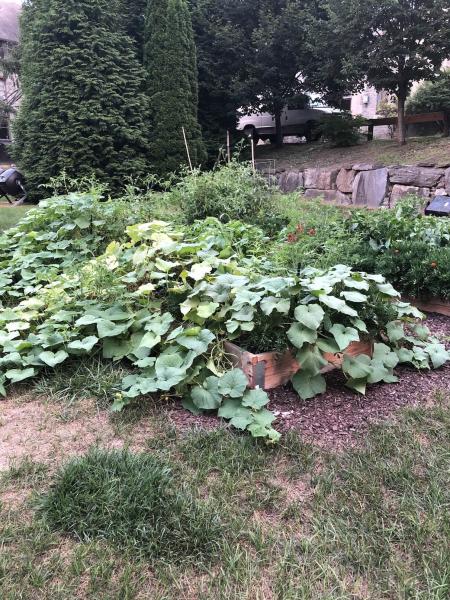
Enjoying the fruits of his labors in the seminary garden
Besides that, it was the joy of singing. We had some fantastic concert series while I was here, and those are some wonderful memories. Then there were the late-night chats in the hallway with friends, getting so excited about whatever we were discussing, telling ourselves, "We should go to bed," but then starting up again.
It sounds like you're making new memories now with the community and some fun new initiatives like the fermentation club.
Yes, the fermentation club has been great! There are some really inspiring students here who have a gift for bringing people together. Just last night, the north side of campus had a little bonfire block party. Anyone was welcome, and we stayed up late, reminding ourselves about liturgy the next day but just enjoying being together. I think the pizza ovens are coming out for the next one!

